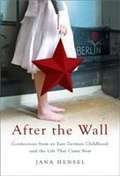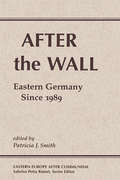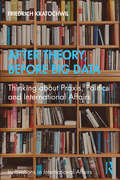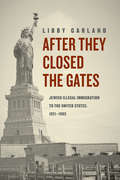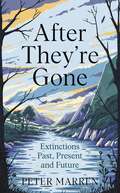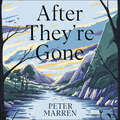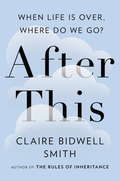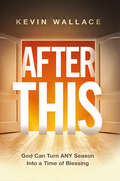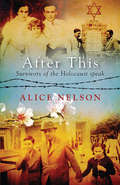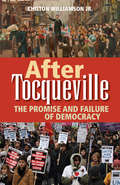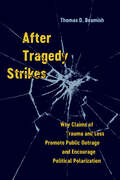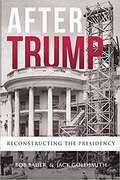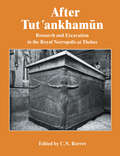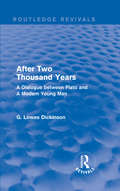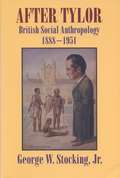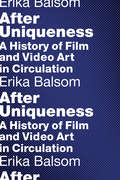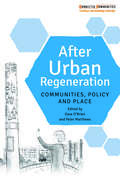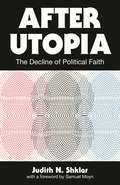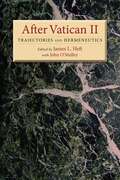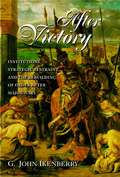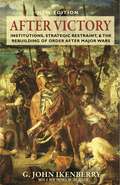- Table View
- List View
After The Wall: Confessions From An East German Childhood And The Life That Came Next
by Jefferson Chase Jana HenselJana Hensel was thirteen on November 9, 1989, the night the Berlin Wall fell. In all the euphoria over German reunification, no one stopped to think what it would mean for Jana and her generation of East Germans. These were the kids of the seventies, who had grown up in the shadow of Communism with all its hokey comforts: the Young Pioneer youth groups, the cheerful Communist propaganda, and the comforting knowledge that they lived in a Germany unblemished by an ugly Nazi past and a callouscapitalist future. Suddenly everything was gone. East Germany disappeared, swallowed up by the West, and in its place was everything Jana and her friends had coveted for so long: designer clothes, pop CDs, Hollywood movies, supermarkets, magazines. They snapped up every possible Western product and mannerism. They changed the way they talked, the way they walked, what they read, where they went. They cut off from their parents. They took English lessons, and opened bank accounts. Fifteen years later, they allhave the right haircuts and drive the right cars, but who are they? Where are they going? InAfter the Wall, Jana Hensel tells the story of her confused generation of East Germans, who were forced to abandon their past and feel their way through a foreign landscape to an uncertain future. Now as they look back, they wonder whether the oppressive, yet comforting life of their childhood wasn't so bad after all.
After The Wall: Eastern Germany Since 1989 (Eastern Europe After Communism Ser.)
by Patricia J SmithSince the fall of the Berlin Wall in November 1989, Germany has faced complex challenges. The rapid introduction of political, economic, and social union in 1990 joined East and West in an experiment without precedent, as the former German Democratic Republic adopted the structures of the Federal Republic of Germany. Related issues include the ado
After Theory, Before Big Data: Thinking about Praxis, Politics and International Affairs (Innovations in International Affairs)
by Friedrich KratochwilThis book’s key purpose is to contribute to the ongoing "theoretical" discussion in the field of international relations (IR) concerning the status of grand theories. However, it also has a wider, critical mission: to challenge mainstream social science and its dominant methodology, as well as the unfettered optimism that the problem of social order can be solved by the "application" of scientific knowledge to our practical problems. The author uses rigorous philosophical analysis to focus on the unexamined assumptions that form the bedrock of many contemporary scholars in IR and demonstrates the unavailability of a universal "scientific" procedure for finding the facts, when we face practical choices and issues of social reproduction. This book will be of interest to upper-level students of IR, sociology, history, and philosophy of science; it will also speak to students of security, foreign policy making, migration, and political economy, in addressing the basis of their attitudes in thinking about the world and the role of scholarship.
After They Closed the Gates: Jewish Illegal Immigration to the United States, 1921-1965
by Libby GarlandIn 1921 and 1924, the United States passed laws to sharply reduce the influx of immigrants into the country. By allocating only small quotas to the nations of southern and eastern Europe, and banning almost all immigration from Asia, the new laws were supposed to stem the tide of foreigners considered especially inferior and dangerous. However, immigrants continued to come, sailing into the port of New York with fake passports, or from Cuba to Florida, hidden in the holds of boats loaded with contraband liquor. Jews, one of the main targets of the quota laws, figured prominently in the new international underworld of illegal immigration. However, they ultimately managed to escape permanent association with the identity of the OC illegal alienOCO in a way that other groups, such as Mexicans, thus far, have not. Ina"After They Closed the Gates, a"Libby Garland tells the untold stories of the Jewish migrants and smugglers involved in that underworld, showing how such stories contributed to growing national anxieties about illegal immigration. Garland also helps us understand how Jews were linked to, and then unlinked from, the specter of illegal immigration. By tracing this complex history, Garland offers compelling insights into the contingent nature of citizenship, belonging, and Americanness. "
After They're Gone: Extinctions Past, Present and Future
by Peter Marren'Wise, challenging and offering some unexpected laughter in the dark, this is a rational and insightful account of the sixth great extinction event. Peter Marren is a brilliant writer and a national treasure.' PATRICK BARKHAM'Thoughtful, fascinating and very timely.' STEPHEN MOSS'Important and thought-provoking.' CAROLINE LUCAS, GREEN PARTY MP'Essential reading. Marren makes a page-turner out of Armageddon.' SIMON BARNES'In his characteristic style Peter Marren has humanised the story of wildlife losses with humour and wit but also with his enormous knowledge and deep love for the living world.' MARK COCKERWe are in the midst of an extinction event: the sixth mass extinction on earth and one entirely caused by mankind. All species become extinct sooner or later, but we have accelerated that natural process several hundredfold and now, it is happening right in front of our eyes. Extinction has a terrifying finality to it. And many species have already been lost to us forever; there is little we can do about that.What we can do, however, is reflect, remember, and ultimately acknowledge the unvarnished truth. We must see the natural world as it is, and not as we might want it to be. Our trajectory is one that has benefited one species alone - humankind. For all other beings, from mammals to fish, from birds to insects and coral, from plants to lichens and fungi, the future, for better or worse, is in our hands.
After They're Gone: Extinctions Past, Present and Future
by Peter Marren'Wise, challenging and offering some unexpected laughter in the dark, this is a rational and insightful account of the sixth great extinction event. Peter Marren is a brilliant writer and a national treasure.' PATRICK BARKHAM'Thoughtful, fascinating and very timely.' STEPHEN MOSS'Important and thought-provoking.' CAROLINE LUCAS, GREEN PARTY MP'Essential reading. Marren makes a page-turner out of Armageddon.' SIMON BARNES'In his characteristic style Peter Marren has humanised the story of wildlife losses with humour and wit but also with his enormous knowledge and deep love for the living world.' MARK COCKERWe are in the midst of an extinction event: the sixth mass extinction on earth and one entirely caused by mankind. All species become extinct sooner or later, but we have accelerated that natural process several hundredfold and now, it is happening right in front of our eyes. Extinction has a terrifying finality to it. And many species have already been lost to us forever; there is little we can do about that.What we can do, however, is reflect, remember, and ultimately acknowledge the unvarnished truth. We must see the natural world as it is, and not as we might want it to be. Our trajectory is one that has benefited one species alone - humankind. For all other beings, from mammals to fish, from birds to insects and coral, from plants to lichens and fungi, the future, for better or worse, is in our hands.
After They're Gone: Extinctions Past, Present and Future
by Peter MarrenThe past, present and future of extinction from a world-leading naturalist.We are in the midst of an extinction event: the sixth mass extinction on earth and one entirely caused by mankind. All species become extinct sooner or later, but we have accelerated that natural process several hundredfold and now, it is happening right in front of our eyes. Extinction has a terrifying finality to it. And many species have already been lost to us forever; there is little we can do about that.What we can do, however, is reflect, remember, and ultimately acknowledge the unvarnished truth. We must see the natural world as it is, and not as we might want it to be. Our trajectory is one that has benefited one species alone - humankind. For all other beings, from mammals to fish, from birds to insects and coral, from plants to lichens and fungi, the future, for better or worse, is in our hands.'Wise, challenging and offering some unexpected laughter in the dark, this is a rational and insightful account of the sixth great extinction event. Peter Marren is a brilliant writer and a national treasure.' PATRICK BARKHAM'Thoughtful, fascinating and very timely.' STEPHEN MOSS'Important and thought-provoking.' CAROLINE LUCAS, GREEN PARTY MP'Essential reading. Marren makes a page-turner out of Armageddon.' SIMON BARNES'In his characteristic style Peter Marren has humanised the story of wildlife losses with humour and wit but also with his enormous knowledge and deep love for the living world.' MARK COCKER(P) 2022 Hodder & Stoughton Limited
After This
by Claire Bidwell SmithIn After This, acclaimed author, and therapist Claire Bidwell Smith confronts the question she encounters every day in private practice--what happens after we die? In an exploration of the afterlife that is part personal, part prescriptive--Smith invites us on her journey into the unknown. She wonders: How do we grieve our loved ones without proof that they live on? Will we ever see them again? Can they see us now, even though they are gone?Chronicling our steps along the path that bridges this world and the next, Smith undergoes past-life regressions and sessions with mediums and psychics and immerses herself in the ceremonies of organized religion and the rigor of scientific experiments to try and find the answers. Drawing on both her personal losses, recounted in her memoir The Rules of Inheritance, as well as her background working in hospice as a bereavement counselor, Smith attempts to show how exploring the afterlife can have a positive impact on the grief process. personal journey that underlies the book's message: What we believe about what happens next affects everything about how we live--and love--right now.
After This... An Inspirational Journey for All the Wrong Reasons
by Marcus EngelCatastrophic injuries. Immediate and total blindness. An innocent young life shattered at the hands of a drunk driver. This is an unforgettable account of turning tragedy into triumph. With heart wrenching honesty, humor and insight, Marcus Engel guides us on a path to self-discovery. This coming-of-age story will cause you to view obstacles as opportunities and discover that choices, not circumstances, determine ultimate happiness. "All medical personnel who read this book will experience a transformation in their understanding and approach to the severely injured patient. Engel so vividly describes the steps in his recovery, I was moved to tears." Paul H.Ward M.D. F.A.C.S. Professor of Surgery Emeritus Chief of Head and Neck Surgery Emeritus UCLA School of Medicine "Engel's perseverance and determination offer an inspiring illustration of the human spirit. Marcus' story will provide immeasurable benefit to every student and parent." Steve Hirst Director of Greek Life Wake Forest University
After This: God Can Turn Any Season Into a Time of Blessing
by Kevin WallaceWhat if just beyond this season of turmoil is your best season yet? This book will help you understand that God is working all things for your good and that He can turn any season into a time of blessing. It would be easy to navigate life if every problem, every pain, and every setback came with a telegraph that enabled us to prepare for their arrival. But often our greatest struggles come with the least warning and feel like the greatest threat to our future. Even the most committed Christians find themselves in seasons that challenge their faith, shake their hopes, and make them fearful when thinking of the future. In Acts 8, the church experienced an unprecedented season of persecution, pain, and chaos. One of their leaders, Stephen, had been killed. The believers were being hunted. Their lives were being threatened. In addition to the fear and frenzy, Saul was wreaking havoc in the church. But following this season of being persecuted and terrorized, Acts 9:31 reveals that God changed the trajectory of their lives with two words: after this! After the pain, the fear, the loss, the misery, after the confusion and chaos, God decided it was time to change their season. The season of struggle that seemed like it would last forever had an expiration date! Like the early church, we must see that no matter how tough the situation we&’ve walked through has been, it will not end there! There is a blessing and breakthrough coming after this!After This is an encouraging compass that points us to all that is waiting for us in the next season of our lives. It is a prophetic word revealing that this coming shift is a transition into a time of peace, multiplication, comfort, and strength. After the misery, after the mess, after the divorce, after the break up, after the bankruptcy, after the failure—even after COVID-19—there is an &“after this&” coming that will change everything for those who belong to God.
After This: Survivors of the Holocaust Speak
by Alice NelsonSydney Morning Herald Best Young Australian Novelist Alice Nelson provides the introductory essay for After This, a powerful collection of narratives by fourteen Holocaust survivors. Alice worked closely with local survivors and their families to present each individual’s record of those terrible years – stories like that of Rosa Levy, whose tale of moving to Australia after the war is one of quiet triumph.
After Tocqueville: The Promise and Failure of Democracy
by Chilton Williamson Jr.The End of Democracy? The fall of the Berlin Wall. The collapse of the Iron Curtain. The Orange Revolution. The Arab Spring.The rush of events in recent decades seems to confirm that Alexis de Tocqueville was right: the future belongs to democracy. But take a closer look. The history of democracy since the 1830s, when Tocqueville wrote Democracy in America, reveals a far more complicated picture. And the future, author Chilton Williamson Jr. demonstrates, appears rather unpromising for democratic institutions around the world.The fall of communism sparked the popular notion that the spread of democracy was inevitable. After Tocqueville challenges this sunny notion. Various aspects of twenty-first-century life that Tocqueville could scarcely have imagined—political, economic, social, religious, intellectual, technological, environmental—militate against democracy, both in developing societies and in the supposedly democratic West.This piercing, elegantly written book raises crucial questions about the future of democracy.
After Tragedy Strikes: Why Claims of Trauma and Loss Promote Public Outrage and Encourage Political Polarization
by Thomas D. BeamishWhile trauma and loss can occur anywhere, most suffering is experienced as personal tragedy. Yet some tragedies transcend everyday life's sad but inevitable traumas to become notorious public events: de facto "public" tragedies. In these crises, suffering is made publicly visible and lamentable. Such tragedies are defined by public accusations, social blame, outpourings of grief and anger, spontaneous memorialization, and collective action. These, in turn, generate a comparable set of political reactions, including denial, denunciation, counterclaims, blame avoidance, and a competition to control memories of the event. Disasters and crises are no more or less common today than in the past, but public tragedies now seem ubiquitous. After Tragedy Strikes argues that they are now epochal—public tragedies have become the day's definitive social and political events. Thomas D. Beamish deftly explores this phenomenon by developing the historical context within which these events occur and the role that political elites, the media, and an emergent ideology of victimhood have played in cultivating their ascendence.
After Trump: Reconstructing The Presidency
by Jack Goldsmith Bob BauerIn After Trump: Reconstructing the Presidency, Bob Bauer and Jack Goldsmith provide a comprehensive roadmap for reform of the presidency in the post-Trump era.In fourteen chapters they offer more than fifty concrete proposals concerning presidential conflicts of interest, foreign influence on elections, pardon power abuse, assaults on the press, law enforcement independence, Special Counsel procedures, FBI investigations of presidents and presidential campaigns, the role of the White House Counsel, war powers, control of nuclear weapons, executive branch vacancies, domestic emergency powers, how one administration should examine possible crimes by the president of a prior administration, and more. <P><P>Each set of reform proposals is preceded by rich descriptions of relevant presidential history, and relevant background law and norms, that place the proposed reforms in context. All of the proposals are prefaced by a chapter that explains how Trump--and, in some cases, his predecessors--conducted the presidency in ways that justify these reforms.After Trump will thus be essential reading for the coming debate on how to reconstruct the laws and norms that constitute and govern the world’s most powerful office.It’s hard to imagine two better co-authors for the task. Both served in senior executive branch positions—in the administrations of Barack Obama and George W. Bush, respectively—and have written widely on the presidency.Bob Bauer served from 2010-2011 as White House Counsel to President Barack Obama, who in 2013 named Bauer to be Co-Chair of the Presidential Commission on Election Administration. He is a Professor of Practice and Distinguished Scholar in Residence at New York University School of Law, as well as the co-director of its Legislative and Regulatory Process Clinic.Jack Goldsmith served as Assistant Attorney General, Office of Legal Counsel from 2003-2004, and Special Counsel to the Department of Defense from 2002-2003. He is the Learned Hand Professor at Harvard Law School, co-founder of Lawfare, and a Senior Fellow at the Hoover Institution. Together, in this book, they set the terms for the national discussion to come about the presidency, its powers, and its limits.
After Tutankhamun
by ReevesFirst published in 1992. Routledge is an imprint of Taylor & Francis, an informa company.
After Two Thousand Years: A Dialogue between Plato and A Modern Young Man (Routledge Revivals: Collected Works of G. Lowes Dickinson)
by G. Lowes DickinsonFirst published in 1930, this book presents an imagined account of conversation between Plato and ‘A Modern Young Man’. In the first part, political and social institutions are considered and property, forms of government, socialism, the control of population, war and education, are discussed. The second part examines the idea of real Goods including the concepts of truth, art and love. In this work, the author sees Plato reaffirming his belief that real Goods come from some higher world, which it is the destiny of the spirits to pursue.
After Tylor: British Social Anthropology, 1888-1951
by George W. StockingA sequel to Victorian Anthropology, Stocking's widely acclaimed study of British anthropology and the Darwinian Revolution, After Tylor is the first comprehensive exploration of the intellectual transition that gave rise to modern British social anthropology.
After Uniqueness: A History of Film and Video Art in Circulation (Film and Culture Series)
by Erika BalsomImages have never been as freely circulated as they are today. They have also never been so tightly controlled. As with the birth of photography, digital reproduction has created new possibilities for the duplication and consumption of images, offering greater dissemination and access. But digital reproduction has also stoked new anxieties concerning authenticity and ownership. From this contemporary vantage point, After Uniqueness traces the ambivalence of reproducibility through the intersecting histories of experimental cinema and the moving image in art, examining how artists, filmmakers, and theorists have found in the copy a utopian promise or a dangerous inauthenticity—or both at once. <P><P>From the sale of film in limited editions on the art market to the downloading of bootlegs, from the singularity of live cinema to video art broadcast on television, Erika Balsom investigates how the reproducibility of the moving image has been embraced, rejected, and negotiated by major figures including Stan Brakhage, Leo Castelli, and Gregory Markopoulos. Through a comparative analysis of selected distribution models and key case studies, she demonstrates how the question of image circulation is central to the history of film and video art. After Uniqueness shows that distribution channels are more than neutral pathways; they determine how we encounter, interpret, and write the history of the moving image as an art form.
After Urban Regeneration: Communities, Policy and Place (Connected Communities)
by Dave O'Brien and Peter MatthewsAfter Urban Regeneration is a comprehensive study of contemporary trends in urban policy and planning. Leading scholars come together to create a key contribution to the literature on gentrification, with a focus on the history and theory of community in urban policy. Engaging with debates as to how urban policy has changed, and continues to change, following the financial crash of 2008, the book provides an essential antidote to those who claim that culture and society can replicate the role of the state. Based on research from the UK Arts and Humanities Research Council’s Connected Communities programme and with a unique set of case studies drawing on artistic and cultural community work, the book will appeal to scholars and students in geography, urban studies, planning, sociology, law and art as well as policy makers and community workers.
After Utopia: The Decline of Political Faith
by Judith N. ShklarA political philosophy classic from one of the foremost political thinkers of the twentieth centuryAfter Utopia was Judith Shklar’s first book, a harbinger of her renowned career in political philosophy. Throughout the many changes in political thought during the last half century, this important work has withstood the test of time. In After Utopia, Shklar explores the decline of political philosophy, from Enlightenment optimism to modern cultural despair, and she offers a critical, creative analysis of this downward trend. She looks at Romantic and Christian social thought, and she shows that while the present political fatalism may be unavoidable, the prophets of despair have failed to explain the world they so dislike, leaving the possibility of a new and vigorous political philosophy. With a foreword by Samuel Moyn, examining After Utopia’s continued relevance, this current edition introduces a remarkable synthesis of ideas to a new generation of readers.
After Vatican II: Trajectories and Hermeneutics
by James L. HeftSince the closing of Vatican II (1962-1965) nearly fifty years ago, several multivolume studies have detailed how the bishops at the council debated successive drafts and finally approved the sixteen documents published as the proceedings of the council. However, opinions vary, sometimes sharply, about the implications of Vatican II. This volume explores the major flashpoints.Contributors:John ConnellyMassimo FaggioliJames L. HeftM. Cathleen KavenyJoseph A. KomonchakJohn O'MalleyFrancis A. SullivanDarlene Fozard WeaverRobin Darling Young
After Victory: Institutions, Strategic Restraint, and the Rebuilding of Order After Major Wars
by G. John IkenberryThe end of the Cold War was a "big bang" reminiscent of earlier moments after major wars, such as the end of the Napoleonic Wars in 1815 and the end of the World Wars in 1919 and 1945. Here John Ikenberry asks the question, what do states that win wars do with their newfound power and how do they use it to build order? In examining the postwar settlements in modern history, he argues that powerful countries do seek to build stable and cooperative relations, but the type of order that emerges hinges on their ability to make commitments and restrain power.The author explains that only with the spread of democracy in the twentieth century and the innovative use of international institutions--both linked to the emergence of the United States as a world power--has order been created that goes beyond balance of power politics to exhibit "constitutional" characteristics. The open character of the American polity and a web of multilateral institutions allow the United States to exercise strategic restraint and establish stable relations among the industrial democracies despite rapid shifts and extreme disparities in power.Blending comparative politics with international relations, and history with theory, After Victory will be of interest to anyone concerned with the organization of world order, the role of institutions in world politics, and the lessons of past postwar settlements for today. It also speaks to today's debate over the ability of the United States to lead in an era of unipolar power.
After Victory: Institutions, Strategic Restraint, and the Rebuilding of Order after Major Wars, New Edition (Princeton Studies In International History And Politics Ser. #161)
by G. John IkenberryThe end of the Cold War was a "big bang" reminiscent of earlier moments after major wars, such as the end of the Napoleonic Wars in 1815 and the end of the world wars in 1919 and 1945. But what do states that win wars do with their newfound power, and how do they use it to build order? In After Victory, John Ikenberry examines postwar settlements in modern history, arguing that powerful countries do seek to build stable and cooperative relations, but the type of order that emerges hinges on their ability to make commitments and restrain power. He explains that only with the spread of democracy in the twentieth century and the innovative use of international institutions—both linked to the emergence of the United States as a world power—has order been created that goes beyond balance of power politics to exhibit "constitutional" characteristics. Blending comparative politics with international relations, and history with theory, After Victory will be of interest to anyone concerned with the organization of world order, the role of institutions in world politics, and the lessons of past postwar settlements for today.
After Victory: Institutions, Strategic Restraint, and the Rebuilding of Order after Major Wars, New Edition - New Edition (Princeton Studies in International History and Politics #161)
by G. John IkenberryThe end of the Cold War was a "big bang" reminiscent of earlier moments after major wars, such as the end of the Napoleonic Wars in 1815 and the end of the world wars in 1919 and 1945. But what do states that win wars do with their newfound power, and how do they use it to build order? In After Victory, John Ikenberry examines postwar settlements in modern history, arguing that powerful countries do seek to build stable and cooperative relations, but the type of order that emerges hinges on their ability to make commitments and restrain power. He explains that only with the spread of democracy in the twentieth century and the innovative use of international institutions—both linked to the emergence of the United States as a world power—has order been created that goes beyond balance of power politics to exhibit "constitutional" characteristics. Blending comparative politics with international relations, and history with theory, After Victory will be of interest to anyone concerned with the organization of world order, the role of institutions in world politics, and the lessons of past postwar settlements for today.
